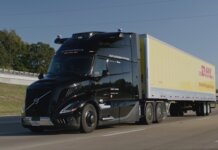The U.K. Government has confirmed that it will end the sale of all new conventional petrol and diesel cars and vans by 2040, as it unveiled new plans to tackle air pollution.
The U.K. Plan for Tackling Roadside Nitrogen Dioxide Concentrations, produced by the Department for Environment, Food, and Rural Affairs and the Department for Transport, is focused on delivering nitrogen dioxide (NO2) compliance at the roadside in the shortest amount of time – part one of the larger program to deliver clean air.
As the second step, the government is expected publish a comprehensive Clean Air Strategy next year that will address other sources of air pollution.
Another element in the plan includes possible civil and criminal charges against manufacturers implementing emissions defeat devices, with fines of up to 50,000 British pounds per instance.
According to the government, air quality in the U.K. has been improving significantly in recent decades, with reductions in emissions of all of the key pollutants, and NO2 levels down by half in the last 15 years.
Despite this, an analysis of over 1,800 of Britain’s major roads show that a small number of these – 81, or 4% – are due to breach legal pollution limits for NO2, with 33 of these outside of London.
In order to accelerate action, local areas will be asked to produce initial plans within eight months and final plans by the end of next year. The government says it will help towns and cities by providing 255 million British pounds to implement their plans, in addition to the 2.7 billion British pounds already committed.
Due to the highly localized nature of the problem, local knowledge will be crucial in solving pollution problems in these hotspots, the announcement asserts. The government will require councils to produce local air quality plans that quickly reduce nitrogen dioxide levels.
As reported, local authorities will be able to bid for money from a new Clean Air Fund to support improvements that will reduce the need for restrictions on polluting vehicles. This could include changing road layouts, removing traffic lights and speed humps, or upgrading bus fleets.
The announcement notes that the U.K. is one of 17 EU countries breaching annual targets for nitrogen dioxide, a problem which has been made worse by the failure of the European testing regime for vehicle emissions.
The government will also issue a consultation in the autumn to gather views on measures to support motorists, residents and businesses affected by local plans – such as retrofitting, subsidized car club memberships, exemptions from any vehicles restrictions, or a targeted scrappage scheme for car and van drivers.
Transport Secretary Chris Grayling says, “We are determined to deliver a green revolution in transport and reduce pollution in our towns and cities. We are taking bold action and want nearly every car and van on U.K. roads to be zero emission by 2050, which is why we’ve committed to investing more than £600 million in the development, manufacture and use of ultra-low emission vehicles by 2020. Today, we commit £100 million towards new low-emission buses and retrofitting older buses with cleaner engines. We are also putting forward proposals for van drivers to have the right to use heavier vehicles if they are electric or gas-powered, making it easier for businesses to opt for cleaner commercial vehicles.”
According to the announcement, local authorities will have access to a range of options to tackle poor air quality in their plans, such as changing road layouts to reduce congestion, encouraging uptake of ultra-low emissions vehicles and retrofitting public transport.
If these measures are not sufficient to ensure legal compliance, local authorities may also need to consider restrictions on polluting vehicles using affected roads. This could mean preventing polluting vehicles using some of these roads at certain times of the day or introducing charging, as the Mayor of London has already announced.
The government notes that local authorities should exhaust other options before opting to impose charging.
Specifically, the U.K. Government is supporting councils to develop these plans through the following:
- A 255 million British pounds implementation fund for all immediate work required to deliver plans within eight months to address poor air quality in the shortest time possible;
- A Clean Air Fund for councils to bid for money to introduce new measures, such as changing road layouts to cut congestion and reduce idling vehicles, new park and ride services, introducing concessionary travel schemes and improving bus fleets.
- A 40 million British pounds Clean Bus Technology Fund grant scheme – part of a 290 million British pounds National Productivity Investment Fund – to limit emissions from up to 2,350 older buses. The government remains committed to putting the public finances back on a sustainable footing, so all money spent on air quality measures will be funded through changes to the tax treatment for new diesel vehicles or through reprioritization within existing departmental budgets.
Further details will be announced later this year. Click here for the full announcement.






